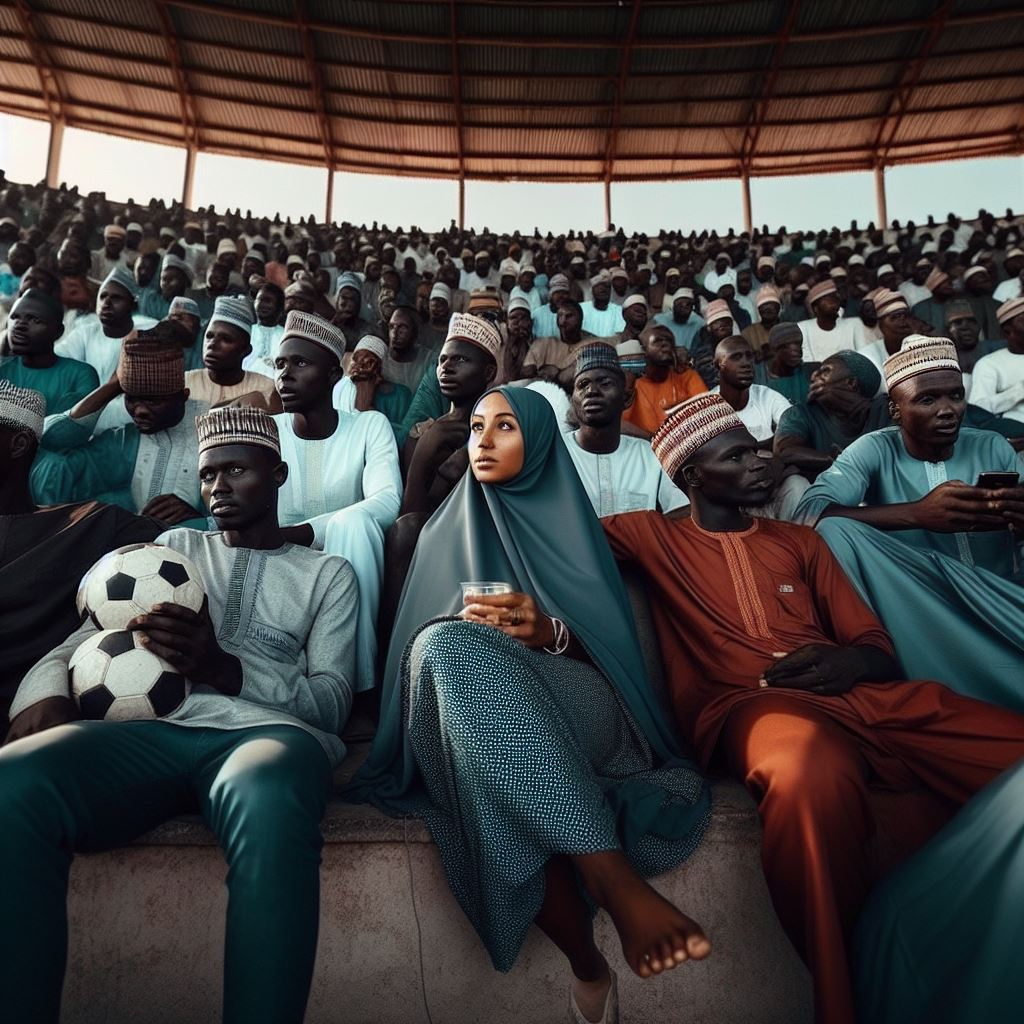Growing up among male siblings in the Bolori area of Nigeria’s Borno State piqued Hafsat Isa’s interest in soccer and action films. She fondly recalled the 2013 African Cup of Nations (AFCON) tournament—the electrifying atmosphere, the raw emotions, the spirit of comradeship—which sealed her passion for the beautiful game.
As a teenager, whenever she laid hold of a friend’s phone, Hafsat would search YouTube for football content. In time she came to admire foreign leagues and their style of play. “I’m a die-hard fan of Barcelona, and watching them play has been a transformational and lovely experience,” Hafsat said.
Hafsat has maintained an unrelenting love for soccer through the years, drawn towards football commentaries and live matches on TV. However, her love for soccer has existed in the face of disparaging comments and public disapproval.
Societal expectations across northern Nigerian communities often relegate Muslim girls,, to the fringes of the game. These stereotypes often restrict girls from ventures that are supposedly masculine. Despite this limitation, Hafsat, together with a growing number of female fans, manages to whet their appetite for the sport.
Like Hafsat, Halimat Adamu, who lives in the center of Lagos, found herself drawn to the world of football from an early age. Having a wider circle of male friends only bolstered this flair for the game. Once she began dating a staunch supporter of Chelsea FC, one of the clubs in the English Premier League, Halima promptly became a fan of the London giants.
Navigating stereotypes
Halimat’s initial experience in Lagos’ public-viewing centres was relatively smooth and cordial. However, the atmosphere was diametrically different in Zaria, when she moved into the ancient town for law studies in 2021.
According to Halimat, the community in Zaria was less tolerant of girls watching football. She recalled an instance when she first went to watch a match outside her campus. Halimat chose a seat beside two men, but they immediately stood up and left with rude remarks. Their comments implied that her rightful place was in the kitchen, not a football-viewing center.
On another occasion, Halimat was denied entry into the viewing center. Although she was told that tickets were unavailable, she learned, through a male acquaintance, that that was not the case.
“Sometimes, I have to resort to getting guys who will buy me tickets, and even then, I face constant negative remarks and unpleasantness inside the viewing center,” Halimat lamented.
Keeping her love for soccer on the downlow ensured that Hafsat didn’t face many such disapproving remarks as with Halimat. “I have only just started talking about football with a few close friends,” Hafsat said.
Having found that some of her friends didn’t approve of her enthusiasm for the game, Hafsat has since learned to be discreet about her passion in public spaces. Yet it irks her when girls are treated differently because of their interest in football. “Everyone should be able to do what they love, no matter what other people think,” Hafsat told Prime Progress.
Breaking barriers
Zaynab Bobi has loved football since she was a little girl in Abuja, Nigeria’s capital. Her love was more than just watching the game. She played football in high school.
“I find the game to be very interesting, both as a player or an audience. The different surge of emotions it comes with makes it interesting,” Zaynab recounted.
These days, Zaynab mostly watches the Super Falcons, Nigeria’s female national team. “It’s not that I like them more, but seeing them play makes me think it’s possible for girls to break the barriers, even in football,” Zaynab explained to Prime Progress.
Zaynab explained that people often expressed shock seeing that she knew much about football. More often than not, these people tried to spike her with such questions as why girls should watch football. But these comments don’t bother her, Zaynab maintained. In a calm retort, she often replied, “why do you think girls shouldn’t watch football?”. This always shut them up, Zaynab said
“Sincerely, I do feel bitter about the stereotypes, but knowing that people will always have that perception, I don’t bother myself. I just continue watching, cheering, and commenting on social media,” Zaynab stated.
The dynamics on social media are not so different. Some detractors on social media argue that girls shouldn’t watch football, as it’s a sport exclusive to boys. But such stereotypes do not hamper Halimat, whose enthusiasm remains solid and unwavering.
For Hafsat, a game of soccer is a memory she always wants to relive, as she hopes these cultural perceptions will change in the near future. She wishes that people are respected for their talents, not judged by stereotypes. “I will keep enjoying football, and I hope to inspire others to pursue what they love without feeling limited by societal expectations,” she said.
Hafsat Isa's interest in soccer was sparked by growing up with male siblings in Borno State, Nigeria, and watching the 2013 African Cup of Nations. Despite societal stereotypes in northern Nigeria limiting Muslim girls' participation in supposedly masculine activities like soccer, Hafsat remains passionate about football, secretly enjoying football content and TV commentaries.
Similarly, Halimat Adamu's interest in soccer grew through her circle of male friends in Lagos and her boyfriend's support for Chelsea FC. However, she faced hostility and exclusion while trying to watch matches in Zaria, where girls watching football was less accepted.
Zaynab Bobi, from Abuja, also defies stereotypes by being an avid football fan and player. She follows the Super Falcons and remains undeterred by negative comments regarding her interest in football.
All three women navigate and challenge the stereotypes against women in soccer in Nigeria, hoping for cultural change and advocating for the freedom to pursue their passions irrespective of societal expectations.






